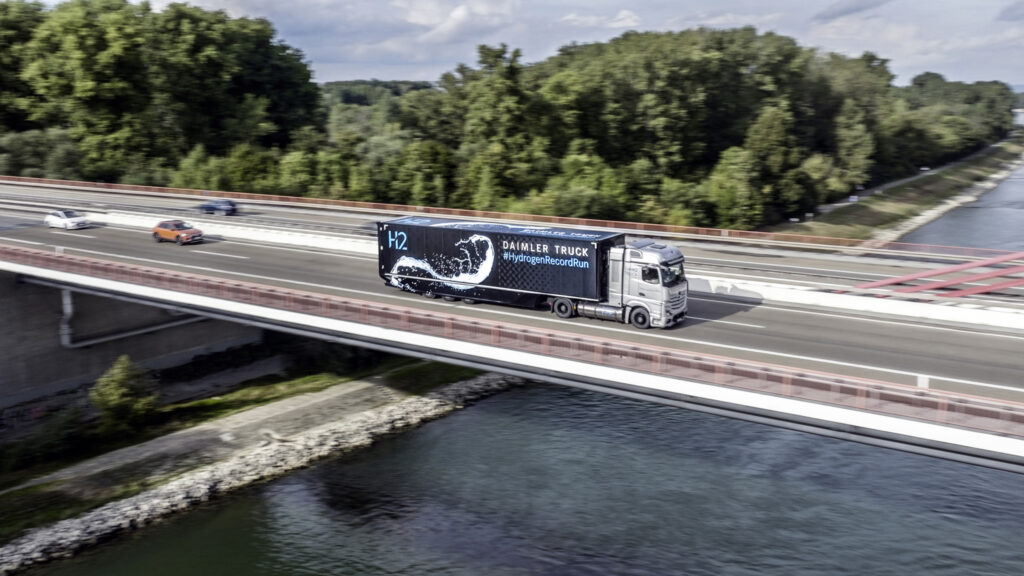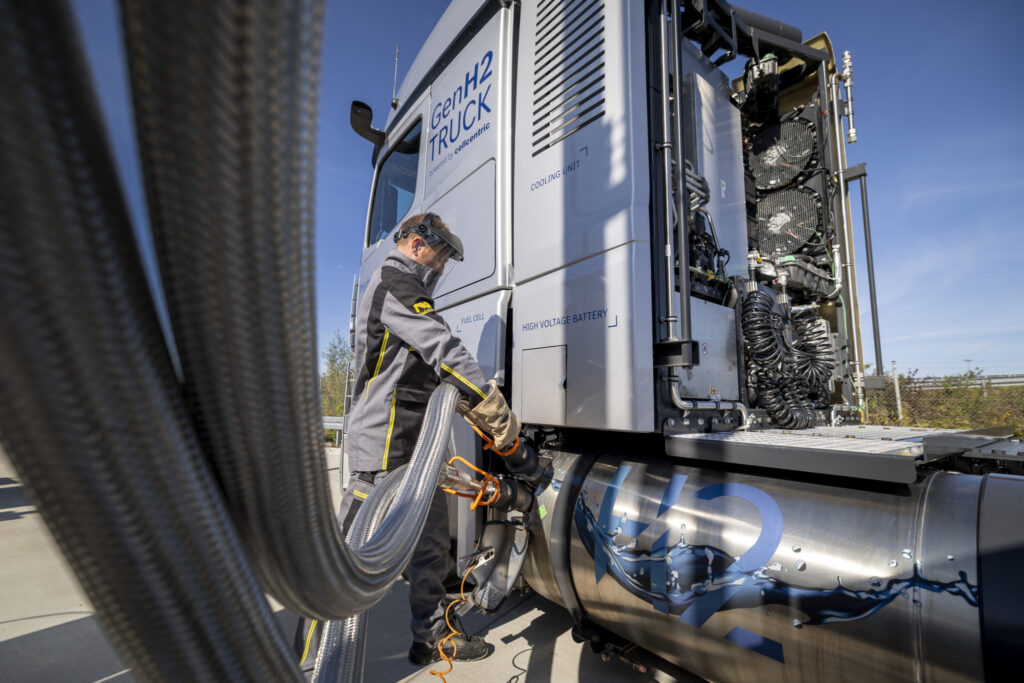Hydrogen-powered Daimler truck passes 1,000 km on single fill
Daimler Truck has completed a 1,047-km run in a fuel-cell-electric truck powered by a single fill of hydrogen – a key demonstration in its bid to promote the technology as a zero-emissions alternative for longhaul trucking.
The Mercedes-Benz GenH2 was equipped with a cellcentric fuel cell system, developed in Canada through a joint venture with Volvo Truck.
Starting Monday afternoon at the Mercedes-Benz Truck Customer Center in Woerth am Rhein, Germany, the truck arrived Tuesday morning in Berlin. Andreas Gorbach, member of the board of management of Daimler Truck AG and head of truck technology, drove the 40-ton configuration across the finish line.
“Today we put an exclamation mark behind the hydrogen story,” he said during a media briefing.
“To decarbonize transport, we need both battery-electric and hydrogen-powered drive technologies. The sweet spot for fuel cell trucks lies in flexible and demanding longhaul transportation tasks.”

Choosing liquid hydrogen
Daimler Truck is leaning toward liquid hydrogen because it has a higher energy density than gaseous forms of the fuel, increasing range.
“At the end of the day it doesn’t make a difference if it’s gas or liquid,” stressed cellcentric CEO Matthias Juryko, referring to the way the hydrogen can be stored on a truck. The pressure inside the fuel cell itself is no higher than what would be found in a bicycle tube.
For this demonstration run, Air Liquide produced the “green” hydrogen using biomethane, and the fuel filled two 40-kilogram tanks mounted on the truck chassis. Chilled to -253 C, it was possible to store 71 kg of fuel per cubic meter, compared to the 46 kg that would be stored at 700 bar and 26 kg at 350 bar.
The infrastructure bottleneck
But sourcing the all-important hydrogen remains a hurdle.
The OEM continues to stress the need for further investments in green hydrogen production and the related infrastructure. While series production of the trucks themselves is targeted for the second half of this decade, “we see the infrastructure and energy availability as the bottleneck,” Gorbach said.
Much of the early development is happening in Europe, but the U.S. has the potential to take the lead when it comes to hydrogen-fueled transportation, he said, referring specifically to the promise of blue hydrogen made with natural gas.
Battery-electric technology won’t decarbonize transportation on its own, he added, referring to its practical range limits of around 500 km.
“Hydrogen really has the sweet spot in longhaul trucking… It’s not going to be all electric and it’s not going to be all hydrogen.”

But when it comes to the fuel cells, much of the work will continue to take place in B.C., even when production ramps up in Germany, Jurytko said.
“The Silicon Valley for fuel cells is Canada. It’s Burnaby.”
Daimler Truck announced its plans to invest in hydrogen-fueled trucking in September 2020, when CEO Martin Daum publicly unveiled the concept truck. Testing was underway in 2021, and recently included a trip up the Brenner Pass.
As far as the technology has come, however, zero-emission gains will still carry a price premium as they come to market.
Driving zero-emission vehicles will continue to be more expensive than diesel because CO2 prices have not been baked into the fuel, Gorbach said, explaining why some regions will be slower to adopt diesel alternatives for trucking.
“There’s a price tag that comes with decarbonization. This is why we need all forces involved.”
Have your say
This is a moderated forum. Comments will no longer be published unless they are accompanied by a first and last name and a verifiable email address. (Today's Trucking will not publish or share the email address.) Profane language and content deemed to be libelous, racist, or threatening in nature will not be published under any circumstances.
-
Maybe if you’re going to use IMHO, try being humble, arm chair QB…
IMHO this makes absolutely no sense, just in terms of cost per Km expecting logistics companies to charge more per Km for longer journeys on the same mode of transport just will not work. With Solutions like battery swapping already in production with companies like Janus Trucks in Australia makes this whole concept redundant.